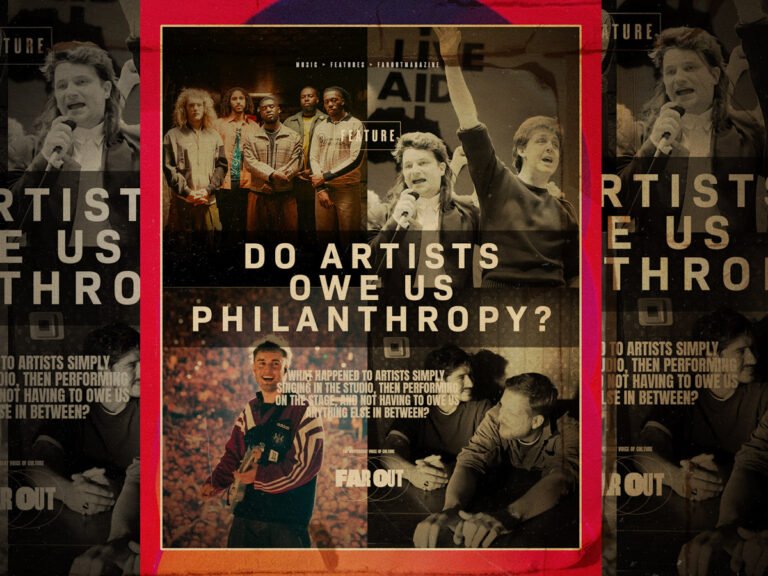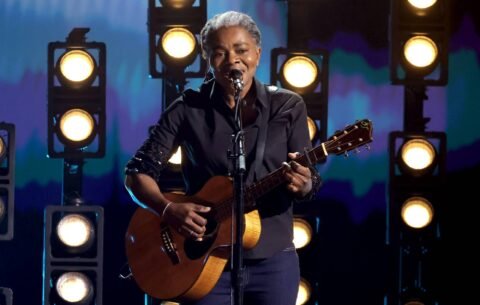
(Credits: Far Out / Alamy / Press)
Once upon a time, rock and roll was all about sex and drugs and an untouchable sense of self-centred hedonism that would garner the charmed adoration of the masses. Now, if someone breaks onto the scene and tries to do that, to put it simply – people just think you’re a bit of a dick. As Bob Dylan so wisely put it all those years ago, “the times, they are a-changing” the world over, but in the musical sphere, perhaps more than most.
This is not to give in to the jaded old creatures existing out there who think that life – and music – peaked in about 1970 and everything else has been downhill since because, contrary to popular belief, that’s certainly not the case. But at least in one respect, you can kind of see their point – what happened to artists simply singing in the studio, then performing on the stage, and not having to owe us anything else in between?
Without hammering home too obvious a point, the root of that change is, of course, social media. As with famous people of every calibre and form, we have greater personal access to our favourite stars than ever before, and with that comes an extra burden of responsibility for those on the receiving end of the heightened attention. It’s almost demanded that artists have a say on every issue in the public conscience, regardless of whether it remotely relates to them or not, creating a whole new minefield world of pedestals, accountability, and connectivity in the process.
While the effectiveness and necessity of star activism is another separate debate, I believe a direct byproduct of this phenomenon is the huge uptick in philanthropic causes that artists are supporting in a public capacity. The cynical among you could suggest that it’s purely a method of improving a squeaky-clean social media image or point-scoring against others in the industry – and there is room for this argument – but there are also increasingly sincere reasons emerging behind it.
For starters, without wishing to become too political about this, the economy isn’t what it was even ten years ago. The ever-starker financial backdrop created by various world events over the years has created untenable circumstances for artists to successfully produce, promote, and tour their music without putting severe pressure on their punters to cough up the cash, let alone funding these projects themselves.

Subsequently, the need for charity from those who can afford it is becoming more pressing than ever. That can be based within a pure industry context—like Mumford and Sons, who are set to donate £1 for every ticket sale on their upcoming UK tour to the newly established Live Trust, set up to support and save grassroots music venues—or can extend further afield to show appreciation for audiences forking out for the live experience.
Of course, artists supporting charity is nothing new, but it now feels more like a prerequisite for approval rather than something done out of the pure goodness of one’s heart. Take the classic case of Live Aid as an example – while the acts who performed were lauded for their participation, those who shunned the gig didn’t experience much more than a slap on the wrist as punishment. If that were to happen now, you can’t help but think it would threaten to derail careers.
Thus, there’s quite a sticky situation to navigate here. Support any old charity, and you could be accused of being inauthentic, but don’t do anything at all and be branded as inactive and complicit. It’s for this reason that organisations like the Live Trust are springing into life, giving artists a chance to affect change in a meaningful way that truly does matter to them.
What are artists doing to create philanthropy of their own?
This is followed closely by a new host of artists whose vision of philanthropy is being tightly woven into their public image, such as Ezra Collective. The London jazz quintet have been vocal about the nascent support from local youth clubs that they would not exist without, and in this sense, charity has become synonymous with their public brand.
When they announced last week that they had launched their own initiative, the Ezra Collective Future Foundation, and would be running an internship programme to help young Black women gain a footing in the music industry, it came as no real surprise. The band are leading the charge, but artistic philanthropy is set to become an increasing norm in the music industry, both for honourable reasons like those outlined and out of pure necessity.
In this sense, there is no concrete answer on whether artists do truly owe us philanthropy. On one level, wall-to-wall charity-giving risks becoming too disingenuous and losing the heart of what making a difference really means if it just becomes par for the course of being a successful artist.
Music may have started out in a completely different universe from politics and economy and hard-hitting issues, but more and more, it is becoming intertwined. Maybe at one time, rock and roll was escapism, but for any young wannabe star wishing to rise the ranks, there’s clearly a lot more active responsibility to be taken than just a life of champagne and roses.
Related Topics




